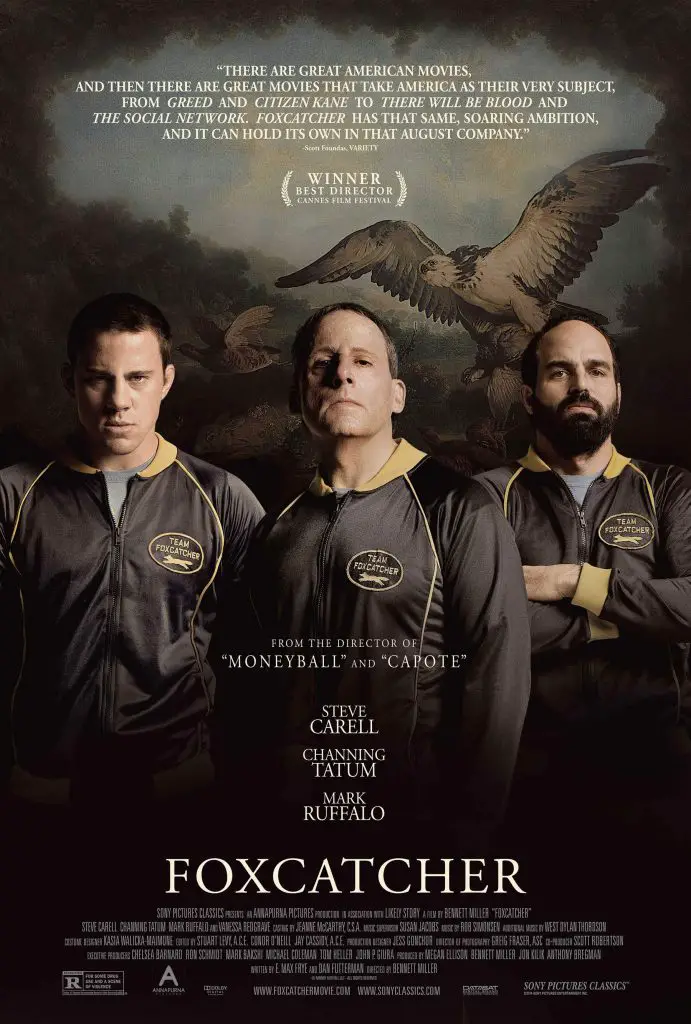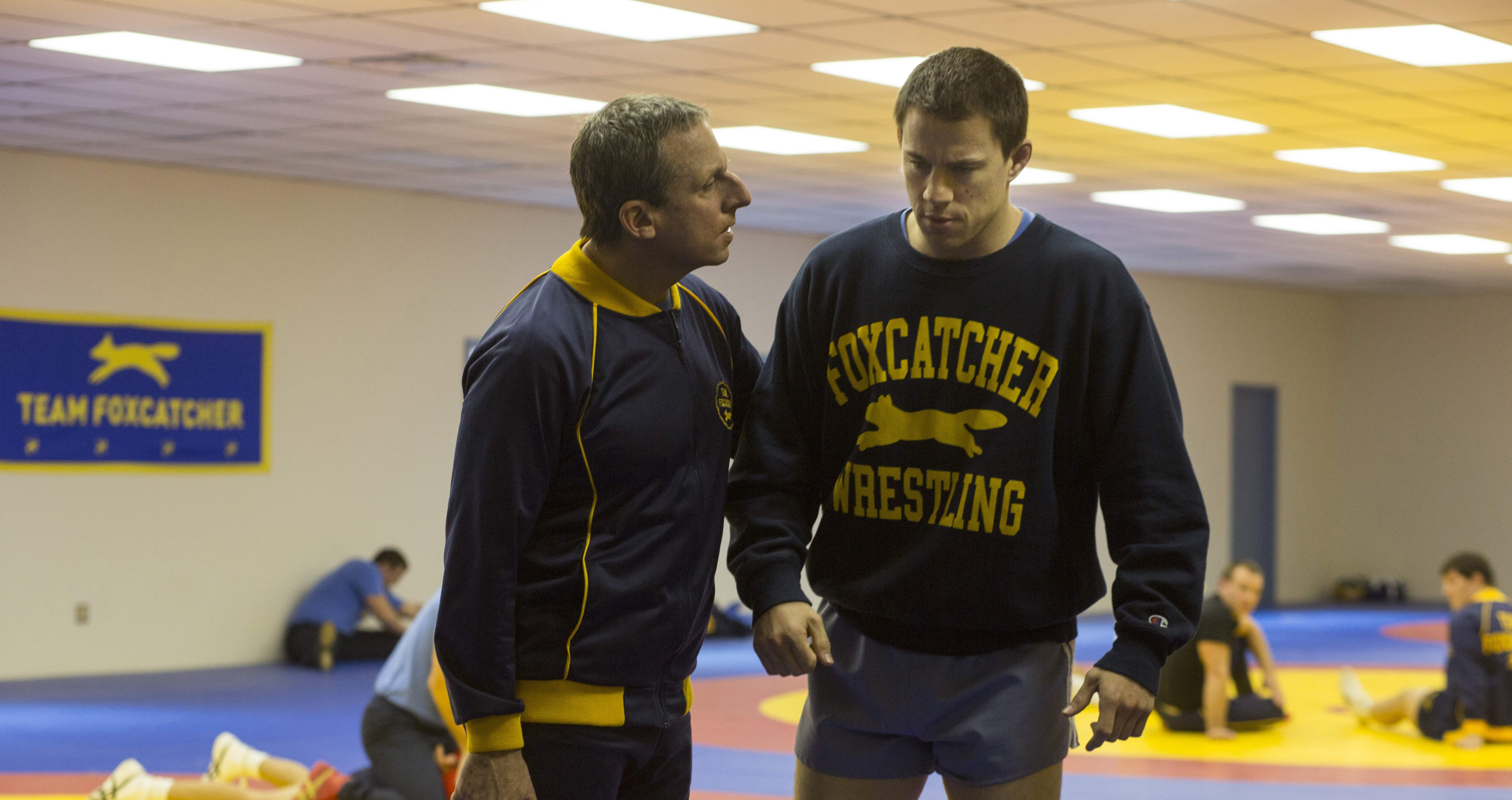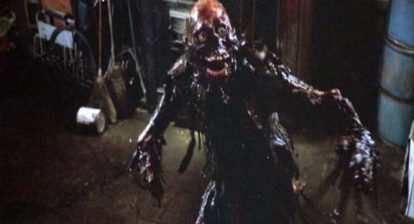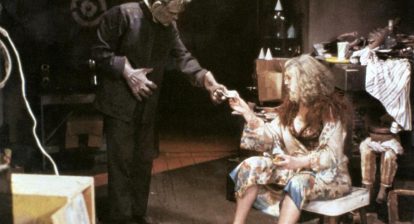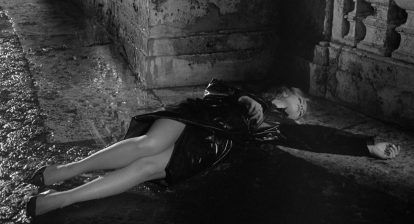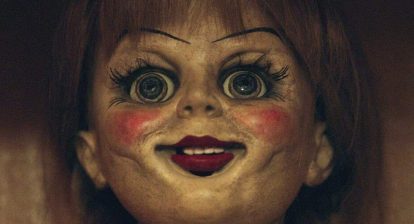Horror is evolving as a genre. Although your local multiplex is still peppered with the usual contenders, look a bit closer at the schedule and you’ll find the latest drama, thriller, or crime offering is closer to horror than you might expect. In this bi-weekly series, Joey Keogh presents a film not generally classified as horror and argues why it exhibits the qualities of a great flight flick, and therefore deserves the attention of fans as an example of Not Quite Horror. This week, it’s Foxcatcher, the truly frightening true-story of two brothers and the megalomaniac rich guy who tore their life apart.
In spite of doing well on the festival circuit (it was nominated for the Palme D’Or), when it was finally released in theatres, Foxcatcher didn’t quite get its anticipated audience, thanks to competing with Clint Eastwood’s massively popular American Sniper. Given the furore surrounding that true-ish story of an army vet struggling with PTSD after the Iraq War, Bennett Miller‘s take on another so-crazy-it-must-be-true story passed most people by. Set primarily in the world of competitive pro-wrestling (the Olympic sport kind, not the Stone Cold Steve Austin kind), clocking in at over two hours and composed of increasingly long, static shots, with little to no musical accompaniment, the film is a bit of a hard sell to mainstream audiences. However, anchored by three, very subtle, key performances and absolutely loaded with tension and suspense, it slowly but surely creeps under your skin.
Foxcatcher is definitely an acquired taste. Venture a look at the IMDb message boards and you’ll find commenters complaining about everything from “the weird sound” to the fact that it’s “so boring” and “pointless”. Neither the typical Oscar bait nor the weird, Eurotrash shocker it would need to be to gain a certain amount of buzz, Miller’s passion project (he’d been working on the movie for about five years before it went into production) is in a category all of its own. It’s lengthy, quite a tough watch at times and nothing really happens for most of it. But there’s an underlying sense of dread, a horrible knowing that sits in the pit of your stomach and whispers in your ear that something is very, very wrong, that makes it impossible to look away.
At first, the movie tricks us into thinking it’s an underdog story, opening with dejected lump Channing Tatum’s (using his immense physicality to wonderful effect) Mark picking up a $20 cheque for giving a speech to a roomful of kids who couldn’t care less, and who were expecting his more successful brother to show up instead. After being plucked from his humdrum life by an unknown investor, Mark is whisked away to Pennsylvania, where his dreams of Olympic glory might just come true. The man promising to make it all happen for him is millionaire John Du Pont, an eccentric fifty-something who lists among his talents stamp-collecting and bird-watching, and informs a bemused Mark, without a shred of irony, that his friends call him “Eagle”.Played with restraint by comedian Steve Carrell (most well-known for playing Brick in Anchorman and Michael Scott in The Office), Du Pont is established first as a harmless, pathetic loser, before morphing, right in front of our eyes, into a violent, bitter, twisted and very spoiled man-child. In one of the film’s most shocking scenes, he strikes Mark hard across the face, whispering coldly that he is “an ungrateful ape”. It epitomises the class struggle at the heart of Foxcatcher, the frighteningly cavernous rich versus poor divide that gives Du Pont ownership of Mark simply because he has the wealth to, essentially, purchase him and, by extension, his talent. He later buys Mark’s brother too, the older, more established and more settled Dave, in whose shadow Mark finds himself permanently stuck, both as a way for his fledgling team to excel and to put Mark in his place.
Mark Ruffalo, who often struggles to find roles to suit his pudgy, sweet features and quiet speaking voice, inhabits Dave, an understanding and loving elder sibling who nurtures and helps Mark, even when he starts going off the rails. It’s a familiar downward trajectory; from snorting cocaine to shaving his head, binge-eating to forced vomiting, Mark begins to fall apart. The standout moment comes when, furious at the state of his athletic career, he smashes his face full-force into a mirror, shattering it everywhere. Reportedly, Tatum missed the prop and put his head through the wall, sustaining a real cut in the process. Eerily, it echoes a similar moment in Nightcrawler, in which Jake Gyllenhaal’s Lou Bloom finds himself losing control of his life and unable to handle it (he allegedly got injured in the scene, also).
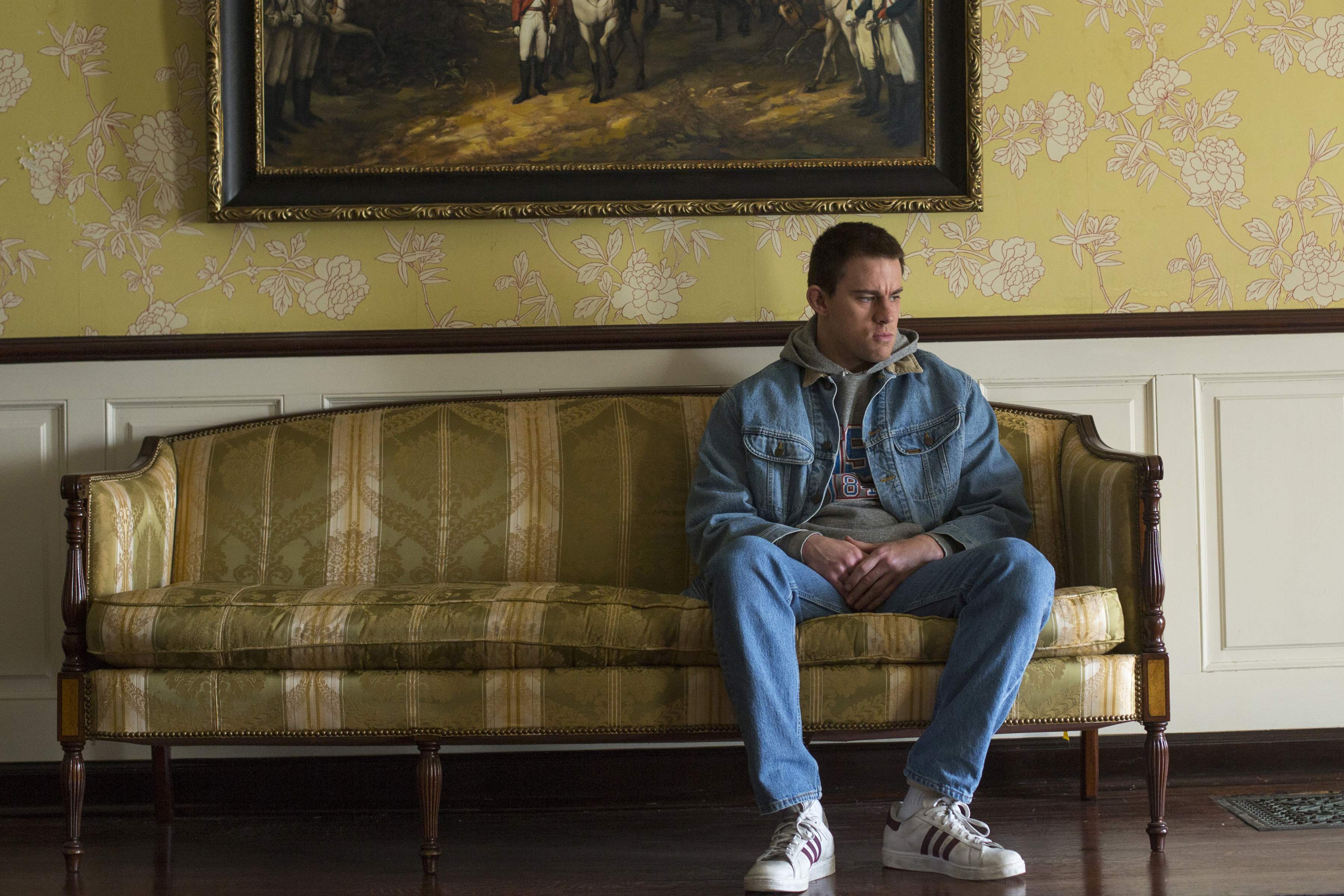 Unlike that film’s hideous sociopath, Foxcatcher‘s villain isn’t obvious from the outset. He becomes known to us as the narrative unfolds, and the fear comes from wondering when exactly he will strike; is it now, as he skulks in the background, watching Mark and Dave from afar? Or when he nonchalantly fires a gun off during a practice session (a moment hinted at in the flick’s gorgeously creepy trailer)? If you’re not familiar with the story of the Schulz brothers, you’d be best advised to avoid it prior to watching as the final moments, which play out in a slow, deliberate manner amidst a blanket of untouched, perfect snow, end with a gut-punch of heart-stopping violence that hits even harder because it’s lifted directly from reality and comes completely out of left field. Thankfully, there’s no Hollywood sheen here; the wrestling is sweaty and tough and the violence is brutal and shocking.
Unlike that film’s hideous sociopath, Foxcatcher‘s villain isn’t obvious from the outset. He becomes known to us as the narrative unfolds, and the fear comes from wondering when exactly he will strike; is it now, as he skulks in the background, watching Mark and Dave from afar? Or when he nonchalantly fires a gun off during a practice session (a moment hinted at in the flick’s gorgeously creepy trailer)? If you’re not familiar with the story of the Schulz brothers, you’d be best advised to avoid it prior to watching as the final moments, which play out in a slow, deliberate manner amidst a blanket of untouched, perfect snow, end with a gut-punch of heart-stopping violence that hits even harder because it’s lifted directly from reality and comes completely out of left field. Thankfully, there’s no Hollywood sheen here; the wrestling is sweaty and tough and the violence is brutal and shocking.
Carrell’s revelatory performance as the unhinged Du Pont has, understandably, been lauded extensively. His soft features hidden thanks to a convincing prosthetic, Carrell works in angles, twisting this way and that, his sizeable beak permanently pointed upwards. He speaks deliberately, slowly, stretching out his vowels and pausing to add emphasis, as though he’s considering every word because he feels his audience may not be worthy of it (Miller, who is also responsible for the late Philip Seymour Hoffman’s transformation in Capote, has said he’s “fascinated by people who have real voices”). It’s an awe-inspiringly dedicated performance, and one which rightly earned him a Best Actor Oscar nod (Mark Ruffalo was also touted for his supporting role).
However, Tatum, who arguably undergoes an even bigger transformation than Carrell, without any pointy enhancements to hide behind, and on whose massive, hulking shoulders the movie balances, was snubbed. Perhaps it was because of his inclusion in fluff like Step Up and Magic Mike, or much like Bradley Cooper before him, maybe he’s yet to make a name for himself as a serious actor and this is considered a fluke. But Tatum’s performance is heart-breaking and exceptional, and Foxcatcher is, for all intents and purposes, his movie. Jutting his jaw out, hunching his shoulders and ambling from scene to scene, he’s virtually unrecognisable. Film critic Alison Wilmore rallied behind Tatum when Foxcatcher was first released, pointing out his commitment to a difficult role that required him to use his immense size and hide behind it. Tatum has admitted in interviews that, when he was originally cast for the role, he didn’t think himself capable of it and almost every day on the set he questioned whether he was doing a good enough job.
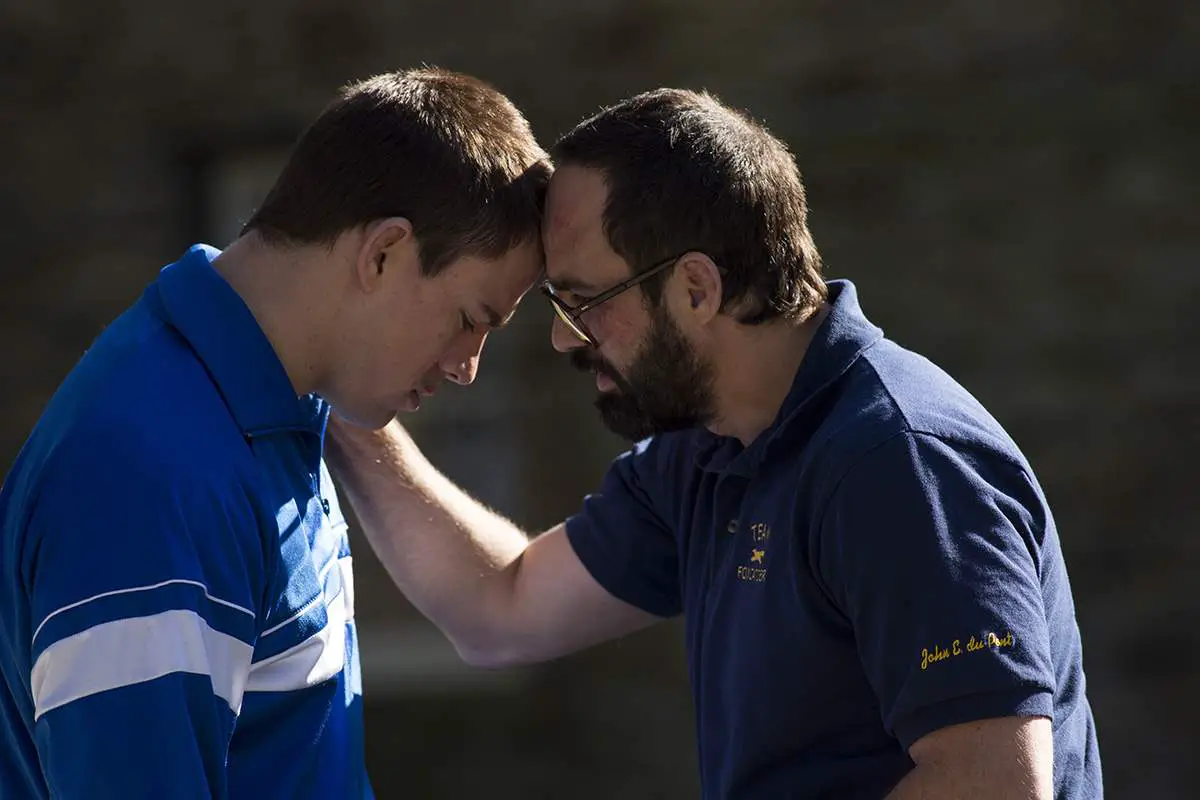 The relationship between Mark and Dave forms the heart of the story. We are first introduced to them as they grapple, silently, on the gym floor before Mark intentionally, or unintentionally (it’s left for us to decide), gives his brother a bloody nose. So much is communicated between the two of them in such a short scene; hurt, anger, frustration, jealousy. Mark is more vulnerable to Du Pont’s manipulation tactics because he’s the loner of the two, whereas Dave has a family and a career. And, indeed, it is Dave who asks Mark “What does he get out of all this?” upon learning of his plans to leave for Pennsylvania. Much has been made of the allegedly homoerotic subtext of Foxcatcher, which seems to hint, in certain scenes such as when Mark shaves Du Pont’s head while wearing only his boxers, that the older man may have had some repressed sexual desires that led to him acting out the way he did against his protégé. The real Mark Schulz took to Facebook to refute these claims, but later apologised for lashing out. There have also been suggestions that Miller purposely left out how those around Du Pont highlighted his mental instability, in order to make the story more dramatic. Regardless of whether you agree on either reading, Foxcatcher is a brutal and terrifying true story, even at its basest form.
The relationship between Mark and Dave forms the heart of the story. We are first introduced to them as they grapple, silently, on the gym floor before Mark intentionally, or unintentionally (it’s left for us to decide), gives his brother a bloody nose. So much is communicated between the two of them in such a short scene; hurt, anger, frustration, jealousy. Mark is more vulnerable to Du Pont’s manipulation tactics because he’s the loner of the two, whereas Dave has a family and a career. And, indeed, it is Dave who asks Mark “What does he get out of all this?” upon learning of his plans to leave for Pennsylvania. Much has been made of the allegedly homoerotic subtext of Foxcatcher, which seems to hint, in certain scenes such as when Mark shaves Du Pont’s head while wearing only his boxers, that the older man may have had some repressed sexual desires that led to him acting out the way he did against his protégé. The real Mark Schulz took to Facebook to refute these claims, but later apologised for lashing out. There have also been suggestions that Miller purposely left out how those around Du Pont highlighted his mental instability, in order to make the story more dramatic. Regardless of whether you agree on either reading, Foxcatcher is a brutal and terrifying true story, even at its basest form.
It’s also a great example of Not Quite Horror; scary, creepy, intense and highly memorable, with celebrated critic David Edelstein even describing it as “one long, sick joke played at half speed”. He meant it as a criticism, but it’s actually to Miller’s credit that Foxcatcher crawls along as it does, with, as Edelstein notes, Du Pont’s eyes getting crazier while nobody around him seems to notice. This creates a queasy, uneasy atmosphere of suspense because, much like the hunters in the opening shots of the movie, we don’t know when he’s going to strike. As a result, everything is amplified, everything has a hidden subtext.
In fact, when someone does realise something us up, it’s clear that, much like Bill Paxton’s nosy journo in Nightcrawler, or Neil Patrick Harris’s obsessed stalker in Gone Girl, it’s only a matter of time before that person is made to pay for their transgression. Favouring suggestion and suspense over all-out gore is one of the strongest hallmarks of Not Quite Horror, because it leaves us to fill in the blanks. As an adaptation of a true story, Foxcatcher hits even harder because its effects are still being felt by real, living people. And not just those whose lives it covers, but the actors who played them. Tatum confessed that he and Ruffalo held each other and cried after shooting the final wrestling scene, because they were so relieved to be putting at least some of the pain and stress of the shoot aside. And, after watching the finished product, it’s hard not to feel exactly the same way.
